And why did Noah find grace?
Why did God save Noah?
Because he walked with God?
Yes, but we are also told: “By faith Noah, being warned of God of things not seen as yet, moved with fear, prepared an ark to the saving of his house; by the which he condemned the world, and became heir of the righteousness which is by faith” (Heb. 11:7).
It took faith to prepare an ark on dry land when it had not even drizzled!
In this same chapter in Hebrews, we are told that it was by faith that Enoch was translated. You see, when the church is taken out of this world, every believer is going because the rapture is for believers, and the weakest saint is going out.
They are going out because God extends mercy, and we are told that the mercy of God will be demonstrated at that time.
Why the Flood?
Why is God going to send the Flood?
Genesis 6:8-13 KJV
[8] But Noah found grace in the eyes of the LORD.
[9] These are the generations of Noah: Noah was a just man and perfect in his generations, and Noah walked with God.
[10] And Noah begat three sons, Shem, Ham, and Japheth.
[11] The earth also was corrupt before God, and the earth was filled with violence.
[12] And God looked upon the earth, and, behold, it was corrupt; for all flesh had corrupted his way upon the earth.
[13] And God said unto Noah, The end of all flesh is come before me; for the earth is filled with violence through them; and, behold, I will destroy them with the earth.
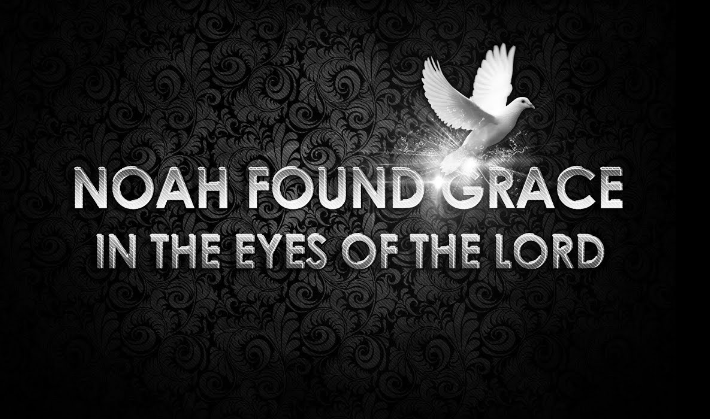
Genesis 6:8
But Noah found grace in the eyes of the LORD.
And why did Noah find grace?
Lest one believe that Noah was spared because of his good works alone, God makes it clear that Noah was a man who believed in God as Creator, Sovereign, and the only Savior from sin. He found grace for himself, because he humbled himself and sought it, he was obedient, as well.
After the finality of God’s statement in the previous verse, verse 8 catches us by surprise. In light of the great wickedness of humanity, the Creator has just expressed the pain His creation of mankind has caused Him.
Even worse, He has announced His plan to wipe humanity, along with birds and animals, from the face of the earth.
Now, however, we are told that one man, Noah, has found favor in God’s eyes. The rest of the chapter will explain exactly what “favor” means. It won’t stop God from carrying out His plan to destroy so much of His creation.
It certainly won’t mean that Noah’s life will be perfect, or easy, or painless. However, it will mean that humanity will continue. The end of civilization will be followed by a new beginning.
Noah will not only survive the upcoming judgment, along with his wife and children, but he will carry on the survival of the human race.
This reference is also important because it is rare. Very few people in the Old Testament are said to have found favor in God’s eyes. Noah was special, and that favored status before God would mean the difference between death and life for future humanity.
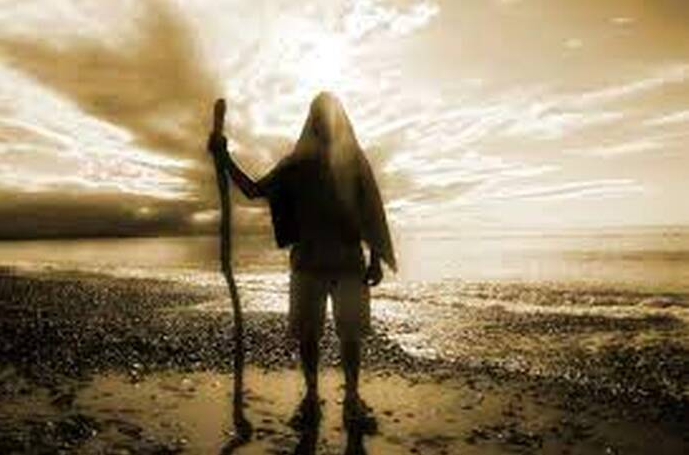
Genesis 6:9
These are the generations of Noah: Noah was a just man and perfect in his generations, and Noah walked with God.
This characterization of Noah creates a sharp contrast with the description of the world at large in Genesis 6:5. Of course, Noah sinned like every other human being. But clearly he did not participate in the general moral decay into which the society around him had fallen.
Noah was a follower of the Lord rather than idols.
But the language and context here distinguish him from other people more on the basis of his character than on the object of his worship. While others are violent, abusive, and self-centered, Noah acts with justice toward others.
The word order is one of increasing spiritual quality before God. Just, is to live by God’s righteous standards. Perfect, sets him apart by a comparison with those of his day. And that he walked with God, puts him in a class with Enoch.
This verse begins a brand new section of Genesis. Just as chapter 5 began with the “generations of Adam,” this new section begins with “the generations of Noah.”
However, the chapter doesn’t immediately launch into a list of Noah’s descendants. Instead, it will first tell his amazing story, beginning with his character.
We are told he is both righteous and blameless among the people of his time. These are both words of comparison. Noah’s choices stood in contrast, at least in God’s sight, to the sinful, selfish choices of the rest of humanity.
Noah was righteous in the sense that he did was right, and he was blameless in the sense that he didn’t do what was wrong. In strong distinction to those around him, Noah was a moral, god-honoring man.
The term blameless is used in Scripture to refer to those who are exceptionally obedient to God (Job 1:1; Luke 1:6). The idea is not someone who is “absolutely perfect.” Noah wasn’t a sinless, morally perfect man.
Only Jesus ever accomplished that (Hebrews 4:14). But by character, reputation, and practice, Noah was exceptional. In simple terms, he did good things and didn’t do bad ones. That set him apart from the rest of humanity.
Even more, we’re told that Noah walked with God. Those words are only said of one other man in Genesis: Enoch, the man God took away without any report of his death (Genesis 5:22–24). Noah enjoyed a very close relationship with God.
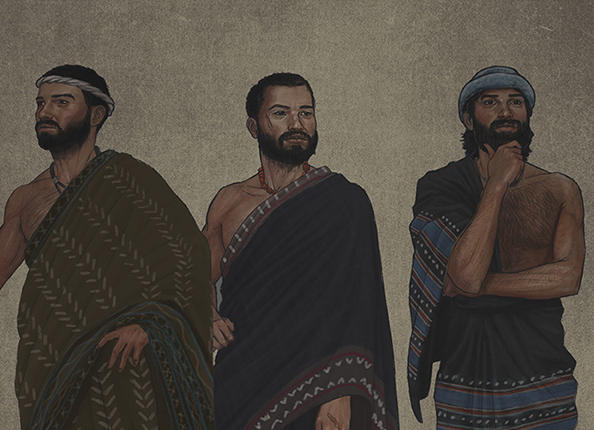
Genesis 6:10
And Noah begat three sons, Shem, Ham, and Japheth.
Noah’s three sons are significant for the role they will play in repopulating the earth after the great flood. As survivors of the catastrophe, Shem, Ham, and Japheth will become the forefathers of all ethnic groups found in Genesis 10.
Presumably, they follow their father’s moral example and avoid the sins of the culture around them.
Noah’s three sons are listed again, as they were in Genesis 5:32. Along with Noah and his wife, these men and their wives will be the only humans saved from God’s judgment on the sins of humanity.
Few other details are given of their lives or character. Strictly speaking, we don’t know who was the oldest or youngest, or exactly how old Noah was when they were born.
Genesis 5:32 gives a rough idea of Noah’s age, but has every appearance of a general statement, not a specific one.
Though the Bible does not say so in explicit terms, we might assume that Noah’s sons also stood apart from the normal wickedness of humanity (Genesis 6:5, 8). This is mostly because they are welcomed on the ark.
The other patriarchs of Genesis chapter 5 are credited with having “many” sons and daughters. Noah is not described in this way. While the Bible does not say, directly, that these were his only three children, that is certainly likely.
Noah’s father Lamech died prior to the flood, and the three sons mentioned in this chapter all survive with Noah on the ark. It’s possible that this was all part of God’s favor on Noah: limiting the loss of his family in judgment.
Another, sadder, possibility is that Noah had other children, who are not mentioned in the Bible. The other patriarchs of Genesis chapter 5 are credited with having children at a much younger age than Noah’s 500 years at the birth of these three sons.
It’s not impossible to think he might have had other children before Shem, Ham, and Japheth. If so, those other offspring would have been destroyed along with the rest of the evil world in the flood.
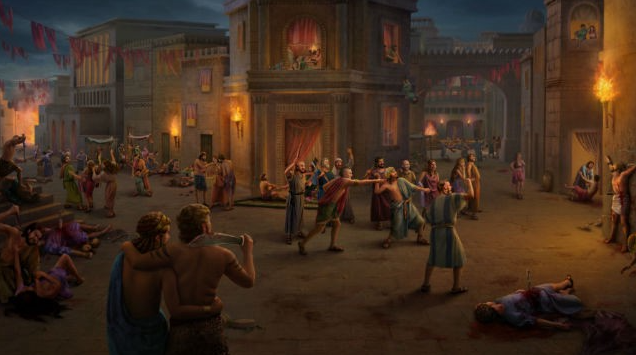
Genesis 6:11
The earth also was corrupt before God, and the earth was filled with violence.
This verse summarizes the more detailed description of society in Genesis 6:4–7. As seen earlier, God intends for humans to manage the earth and all living things responsibly by following His instructions.
While God had commanded Adam and Eve to produce new life, the darker human capacity to murder was introduced in the second generation of the human race. The tendency now seems to be to take life rather than multiply it.
The seed of Satan, the fallen rejectors of God, deceitful and destructive, had dominated the world.
This chapter frequently repeats the reasons for God sending the flood. Verse 5 explained that man, on the whole, thought of nothing but evil. Here, the same idea is brought out again. God sees the earth as it is: corrupt and ruined.
What He had made and observed as good in Genesis 1 He now sees as unacceptably disgraced by human sin. A primary evidence of the corruption of the earth was violence. Instead of being filled with good, the earth was filled with human violence to others.
The Hebrew word translated “violence” here is hā’mās’. This implies more than just the kind of brute force attacks we think of when we hear the English word. This can also include injustice, oppression, and cruelty.
The term also suggests the effects physical violence has on a person or group which has been violently conquered: oppression, deprivation, and misuse. Men of the pre-flood world are not only disobedient to God, they are harsh and abusive to each other.
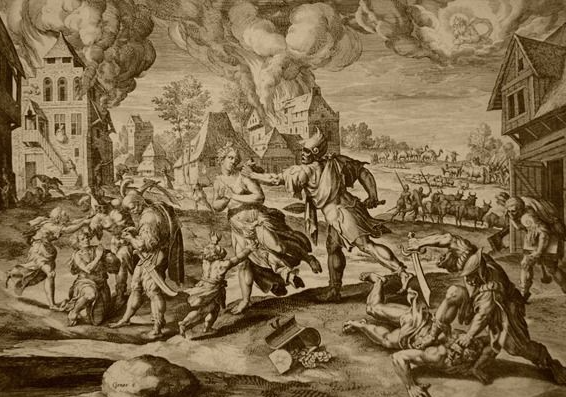
Genesis 6:12
And God looked upon the earth, and, behold, it was corrupt; for all flesh had corrupted his way upon the earth.
The breadth of the problem is stressed in that the phrase all flesh includes all descendants of Adam and Eve. Everyone except Noah has become corrupt.
This implies many self-centered sins. Violent struggles for power, no regard for the common stewardship of the earth’s resources as God originally commanded, etc.
People have come to realize that control of the world at the expense of others can produce great material wealth. That is, man had corrupted God’s way and was going his own way. He had turned from the purpose for which God had created him.
This verse describes the extent of the corruption of sin on the earth: It was everywhere. It was everyone. And it was self-inflicted. “All people” or “all flesh” had corrupted their ways.
In other words, every person was guilty of taking the good thing that God had made—including themselves—and turning it away from God’s good intent to use it for selfishness and evil.
The prior verse described man’s culture as “violent,” from the Hebrew term hā’mās’. This not only includes physical aggression, but cruelty and injustice, as well. Man has rejected God, and turned against each other.
The fact that this evil is so widespread is a primary reason for God’s chosen instrument of destruction: the flood. Left alone, humanity is doomed to fall further and further into sin and evil. Without intervention, there will soon be no godly people left.
To correct the situation, God has chosen to limit the lifespan of human beings (Genesis 6:3), and will eliminate all but a tiny fraction (Genesis 6:8) in order to “reboot” the human race.

Genesis 6:13
And God said unto Noah, The end of all flesh is come before me; for the earth is filled with violence through them; and, behold, I will destroy them with the earth.
By the time Noah comes on the scene, the situation has become so bad that God sees no other solution than to destroy what He has made. Destroy did not mean annihilation, but rather referred to the Flood judgment, both of the earth and its inhabitants.
Theoretically, Genesis 6:7 could signal a return to the timelessness that existed before Genesis 1 after God destroys the universe and all humans with it. Then He could start over. Or God could keep all the inanimate elements of creation intact, then bring new humans into existence.
But since Noah is an exception to the rule of wickedness, God decides to work with him and his family rather than starting from scratch. God’s decision to reveal His plan to Noah further stresses the quality of Noah’s character.
To what extent Noah shares this dire warning with others outside his family is unknown.
Noah is characterized as “a preacher of righteousness” in 2 Peter 2:5, but it is unclear whether that means Noah actually speaks to his contemporaries about the coming judgment and the need to repent.
God is going to send the Flood, and I would like to mention here several reasons why. Man had a promise of a Redeemer, and he was told that there was coming a Savior on the earth. That is the thing man should have been looking for; instead of that, he turned from God.
God had provided a sacrifice for Adam and Eve, and we find that a great, eternal principle was put down with Cain and Abel.
These two boys, Cain and Abel, stand as the representatives of two great systems, two classes of people: the lost and the saved, the self-righteous and the broken-spirited, the formal professor and the genuine believer.
That is what was present in the human race at this time. And then we find that the patriarchs were living so long that the lives of Adam and Methuselah bridged the entire gap from the creation to the Flood.
They certainly could have given a revelation to all mankind, which they did. Then we are told in Jude 14 and 15 that Enoch preached, he prophesied, during that period. We are also told that Noah preached during that period as he was building the ark.
When Enoch disappeared, that should have alerted the people to the intervention of God in human affairs. They also knew about this man Methuselah and the meaning of his name; and when he died, they should have known the Flood was coming.
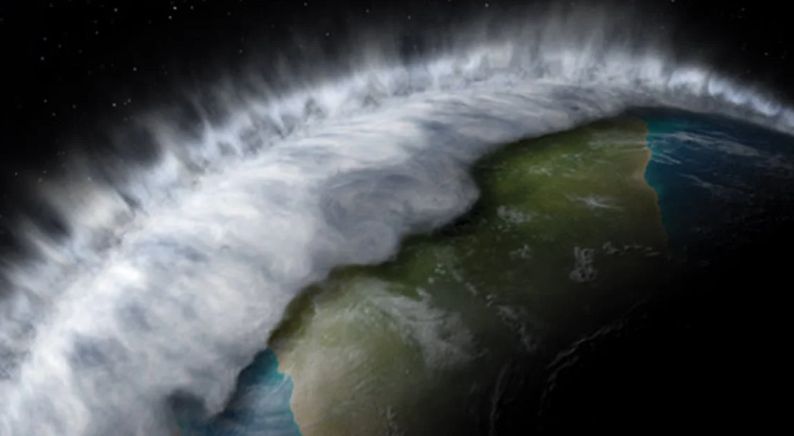
Finally, there was also the ministry of the Holy Spirit. God said that His Spirit would not always strive with man. The Spirit of God was striving with him, but, when man totally rejected God, the Flood came in judgment upon the earth.
The entire human family has turned from God “. . . There is none righteous, no, not one” (Rom. 3:10). There are just a few, though, who do believe Him—Noah and his family. Here is one man who walked with God; he believed God.
Here is a man who still trusted God—“by faith Noah.” Here is a man who was willing to risk building a boat on dry land. If the rains did not come, he certainly would be the laughingstock of the community.
I think he was just that for 120 years, but Noah believed God. There is a striking comparison in the fact that the days of Noah are to be duplicated before the Lord comes again to the earth, not for the Rapture, but to establish His Kingdom.
But there are some remarkable parallels that have already taken place.
For instance, this chapter opened: “And it came to pass, when men began to multiply on the face of the earth, and daughters were born unto them. . . .” There was this tremendous population increase, and by that time man had spread pretty much over the earth.
He was in North America, in Asia, in Europe, and in Africa. He had spread in every direction. Today we have a tremendous population explosion, and men again have increased upon the face of the earth.
Also, there is the fact that during the Great Tribulation period, the Holy Spirit will no longer restrain evil. He will be there to convert men, but we are told very definitely that He will not be restraining evil on the earth.
God’s overtures to men will be despised and rejected, and certainly they are even today. Isn’t it amazing that the only ones who are listened to by the world today are the liberal Protestant and Roman Catholic ministers?
You hear nothing from conservative men.
They have attempted to make some sort of inroad, and they are trying their best to get back in the mainstream, but we have come to the day when, if you are going to stand for God, you will find that you will not be able to talk before a television camera very often.
Instead, you must learn to protest, to march, and to deny Christ before you can expect a television interview!
Finally, the world in that day will be faced with the great problem of the Rapture—there will have been a great number of people who have mysteriously left the earth.
Also there were judgments in Noah’s day, and yet they did not heed them.
God begins revealing His plan to Noah. We can only assume it must have been devastating for Noah to hear. As a righteous, blameless man who walked with God (v. 9), Noah would likely have agreed that the earth was filled with violence because of the sinfulness of humanity.
But could anything have prepared Him for God’s announcement? We can’t be entirely sure about how many relatives, including possibly other children, Noah had at this time. Regardless, the idea of the entire human world being killed would have been terrifying.
In plain language, God told Noah that He was getting ready to put an end to all of humanity because of their violence. He would destroy “all flesh,” meaning both humanity and animals, along with the earth—or land—itself.
In one blunt statement, God announces to Noah both His verdict and the sentence on humanity. God would exercise His right as creator and judge; He would hold His creatures responsible for their sinful choices. He alone had (and still has) both the right and the power to carry out such a plan.
I hope that you have really enjoyed this post,
Please Leave All Comments in the Comment Box Below ↓













One thing that God did promise is that he would never destroy the entire earth with another flood again.
We have had many floods over the years in different parts of the world, but none so catastrophic as the flood that Noah had to face. Imagine living in those times. It must have been terrifying.
Thank you for this interesting article, and although no one knows exactly when the second coming is, it will hopefully explain a lot of things and answer many questions when this does happen.
Hello Michel,
Thank you for your comment on the episode, GOD’s Deliverance From The Judgement Of The Flood, and for considering it interesting.
I can imagine that the violence in the world back then may have similarities to what is going on today, that’s if it’s Not Worse in today’s times.
Thanks again for your time,
Blessings My Friend!
Thank you for delving into the story of Noah and providing insightful explanations for why he found grace in the eyes of the Lord and why God chose to save him amidst the corruption and violence of the world.
Your analysis of Noah’s character, faith, and obedience sheds light on the reasons behind God’s decision.
I appreciate how you emphasize that Noah’s salvation was not solely based on his good works, but rather on his belief in God as Creator, Sovereign, and the only Savior from sin. It’s a reminder that grace and faith play crucial roles in our relationship with God.
Hello Anoth,
Welcome again to the HBS & DwJ website.
Thank you again for commenting on another Holy Bible Study session, turned HBS & DwJ Podcast episode.
You are welcome for the delving into the story about GOD’s Deliverance From The Judgement Of The Flood.
Thank you for your appreciation of this topic. I am so thankful that it peaks your interest at all.
Please come back and visit this website, the podcast, and the store anytime.
Blessings My Friend!
I marvel at the kind of faith demonstrated by both Abraham and Noah.
The level at which they trusted God and followed His instructions is what I find difficult to comprehend. Their kind of faith is what is needed to bring transformation. A God dependent kind of faith.
And this is what is needed to bring deliverance for the church of God.
Hello again Parameter,
Thank you for continuing to read and comment on these HBS & DwJ Holy Bible Studies. Your comments add value to the information that’s already here.
Talk to you soon.
Many Blessings To You My Friend!
I agree with you that this is a fascinating passage from Genesis, and it raises a lot of interesting questions.
I’m also curious about the connection between Methuselah’s name and his death. His name means “man of the dart,” or “his death brings judgment.” And as you mentioned, he died in the same year as the flood. I wonder if there’s any significance to this.
Do you think Methuselah’s long lifespan gave him any special insights into the nature of God or the purpose of life?
Or do you think it was simply a physical phenomenon that had no spiritual significance?
I’m curious to know what you think.
Hello Jeffrey,
Thanks for continuing to stop by the HBS & DwJ Website turned Podcast.
Since I wasn’t there, I can’t be 100% sure, but it may be possible that Methuselah’s name, in fact, might have been a prophecy.
Genesis chapter 6 describes humanity at the end of Methuselah’s life as deeply depraved (Genesis 6:5). And yet, the history of mankind was not lost or obscure. There were men and women walking the earth who had seen, personally, what had happened in the past, and who God was. This makes the depth of sin during Noah’s era all the more tragic.
Strictly speaking, we don’t know anything about Methuselah or his relationship with God. He might have been devout like his father, or he might not. The fact that he dies in the same year as the flood could even mean he was killed by it. We simply do not know.
Thanks again for stopping by,
Blessings My Friend!
Thank you for sharing this insightful article on God’s deliverance from the judgment of the flood.
It’s fascinating to see how Noah found favor in God’s eyes because of his faith and obedience. Despite the wickedness and corruption in the world, Noah stood out as a righteous and blameless man who walked with God.
The decision to send the Flood was a result of the widespread violence and moral decay that had consumed the earth. God, in His righteous judgment, chose to preserve Noah and his family as a remnant of hope for humanity. It’s remarkable to consider that Noah’s faith and his willingness to build the ark, even in the absence of rain, demonstrated his trust in God’s warning.
This story serves as a powerful reminder of God’s mercy and the importance of faith in times of darkness and uncertainty. It also foreshadows future judgment and the need for salvation through faith in Christ.
My questions are:
In what ways can we apply the lessons from Noah’s experience to our lives today?
How can we walk with God and maintain our faith in times of moral decay and challenges?
Hello Israel,
Thank you for your comment on this episode turned HBS & DwJ Podcast episode.
In Noah’s days, the people were so sinful that GOD’s heart was deeply grieved. GOD was grieved by sin then and He’s grieved by our sins now. He can’t just ignore it because He is a Holy and Righteous GOD.
GOD wants a relationship with us and is always willing to go above and beyond to provide a way for that. Even throughout deep sin and a worldwide flood, God provided a way for Noah and his family’s salvation by shutting them in the ark.
He is willing to do the same for us today. It’s never too late for new beginnings because GOD will always provide a way. GOD sees the bigger picture, so we must trust Him even when we don’t understand His ways.
Sometimes obeying GOD means believing and doing things that the world won’t understand, but we know that GOD honors our obedience to him.
All things are possible with GOD. As Christians, we believe that the Bible is 100% true, and that means that we believe in a flood that covered the whole earth. We believe in a GOD that warned, instructed, and protected Noah and his family and loved creation enough to send animals into the ark to protect them.
GOD is able to do far above what we know, expect, and even understand. That was true of Him then and it’s still true of Him today. He did it in Noah’s situation and He can and will do it in ours.
Trust In GOD,
Blessings My Friend!